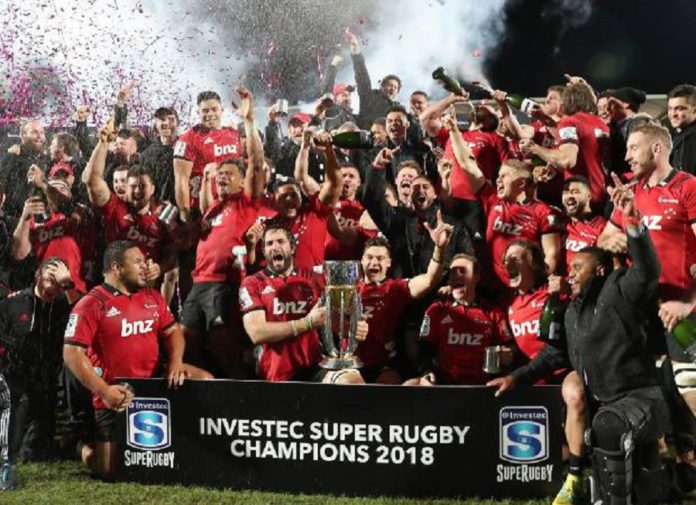This weekend, the Highlanders will host the Chiefs and the Hurricanes will travel to the Blues for the first round of Super Rugby Aotearoa – and the first weekend of rugby around the world since the global shutdown due to the Coronovirus pandemic.
It’s been a challenging time for a number of reasons but fans across the New Zealand – and seemingly around the world – finally have some rugby to get excited about.
“New Zealand is the first to see the sun, the first to celebrate New Year’s, and now we’re the first to get live rugby back,” Tex Texeira, SKY Sports’ Director of Sport and Broadcasting, told RugbyPass. “Not only that, we’re also the first to get any sport in the world back with live crowds.”
While some professional sports took just a small break and pressed forward – notably the Belarussian Premier League – teams have had to play in front of empty stadiums. Super Rugby Aotearoa will go ahead with live crowds, however, and likely some of the biggest crowds that New Zealand has seen in the last decade.
At last count, this weekend’s two matches should bring in over 60,000 excited fans – with Eden Park confirming this afternoon that the Blues’ match tomorrow had been sold out.
WE ARE SOLD OUT!! The 09 is showing out ??
Get to Eden Park early! NO GATE SALES. Public transport included in game ticket!
Don’t stress if you missed out! JUNE 27 vs @Highlanders on sale NOW!! Head to @Ticketmaster_NZ to cop yours!#BluesAllDay #BluesTogether #BLUvHUR pic.twitter.com/N7IIzJCCBn
— The Blues (@BluesRugbyTeam) June 13, 2020
“Believe it or not, it’s been almost three months [since Super Rugby stopped] and it’s just incredible how the world has changed,” said Texeira. “We’ve had to learn how to adapt and we’ve had to prepare for all kinds of scenarios but we’re finally back in New Zealand and hopefully going ahead with rugby as we’re accustomed to – live crowds, live on TV, live on SKY.”
Navigating the uncertainty of the past few months has been challenging for the likes of New Zealand Rugby (NZR), the New Zealand Rugby Players’ Association and SKY, who’ve all coordinated to try get rugby back on screens as soon as possible – providing, of course, that it’s safe for players and other staff involved.
The original expectation was that fans wouldn’t be allowed to attend matches at least for the early stages of the competition, which created a few problems to solve.
“For us, from a production point of view, we watched other sports coming back slowly, like the NRL, and we could see what a challenge not having crowds is,” Texeira said. “Our colleagues in Australia were doing a really good job but let’s face it, having the crowds – not only for the players but for the production, the fans and the people at home – is the ultimate experience.”
There were solutions in place, had New Zealand not progressed to the point where large public gathering were feasible.
“We did have on our list ways to improve the empty stadium experience,” Texeira revealed.
“We had crowd noise on standby. We’d monitored what had been going on in the NRL and because we have dual audio options, we were going down the road of audio 1 would have had this crowd effect and audio 2 would have just had stadium effects and commentary for people that didn’t want to hear the enhanced audio.
“Virtual crowds were also something that we would have loved to have done but we realised very quickly you kind of needed to green screen the stadium and we realised that we’d lose the ball in the air. But of course, there’s no need for any of that now!”
While rugby has been hit hard by the pandemic, it’s also fast-tracked some fresh thinking, which will see one match played on a Sunday afternoon every week.
Fans across the country have long called for afternoon matches – which would make attending matches a lot easier for families who don’t want to be out until 10pm. Given the global audience that tunes into Super Rugby every week, matches have been played in the evenings to maximise viewership – but that could change if the current trial times reap the benefits of larger crowds.
“There’s nothing better than a full rugby stadium,” said Texeira. “We want that as much as New Zealand Rugby, as much as every single player.
“We’ve been talking about [playing afternoon games] with New Zealand Rugby in the past and this was the opportunity to try it. We’ve been getting reasonable crowds in Super Rugby but, to be honest, not the crowds we were accustomed to 10 years ago.
“If the fans do come back and we do fill up stadiums again to a really good number, we’re more than happy to work closely with NZR and ensure that, at the very least, we have Sunday afternoon games. The ultimate and final decision does rest with NZR but we have a really good partnership with them and we have for a long time.
“A full stadium is a great experience, whether you’re at the stadium or you’re at home. We’re very supportive of anything that raises the atmosphere of the game, that raises the ambience for the players, for fans.”
Texeira, first-and-foremost a rugby fan, is especially thrilled to have New Zealand’s top teams going at it tooth-and-nail for 10 weeks of non-stop action.
“The one challenge that Super Rugby has had for a long time is that it’s become a little predictable,” admitted Texeira. “The Crusaders have won 10 titles and not made just four finals series.”
“With Super Rugby Aotearoa, you’ve still got the Crusaders in there and I’m absolutely convinced that they will once again be super formidable but I think when it’s New Zealand teams vs New Zealand teams for 10 weeks, I think that it does make things potentially slightly less predictable because they’ve got to play game-in, game-out against colleagues that will be fighting for All Blacks positions in a couple of months.
“Every single All Blacks selector will be watching every single game. There’s a lot on the table – both from an individual player point of view but from a team point of view also.”
The other benefit of being the one competition that’s currently running is that a few familiar faces will pop up during the season, including former All Blacks Dan Carter and Nehe Milner-Skudder.
“There’s been a lot of talk about the Blues and who’s playing for them,” said Texeira. “The thing is, in any sport, the big names and the big players are massive drawcards. That’s no different here in New Zealand.
“To have Dan Carter, to have Nehe Milner-Skudder with the Highlanders…people follow individuals as much as they follow teams. That’s a fact with any sport in the world, be it a team sport, be it an individual sport, people do follow individuals. Having Dan, having all these great All Blacks in New Zealand. We’re very blessed.”
/cloudfront-ap-southeast-2.images.arcpublishing.com/nzme/VEBSCEE52NBZ3JX7FYIX7ZHCUE.jpg)
There’s also a trove of former players that have returned to New Zealand for the the short-term while they await the resumptions of their own competitions – men like Ben Smith, Julian Savea and Waisake Naholo.
“They will be watching, they will be commenting, and everyone will be really keen to see what the guys say,” Texeira said. “There’ll potentially be a few jibes here and there, which is what we expect, and they’ll just add to that whole experience of a 10-week domestic comp. High engagement and five really great teams having a go for 10 weeks. It’s pretty awesome.”
Super Rugby kicks off at 7:05pm tonight when the Chiefs take on the Highlanders at Forsyth Barr Stadium in Dunedin. On Sunday, the Blues will host the Hurricanes at 3:35pm with the guests eyeing up revenge after their loss earlier in the year.
















